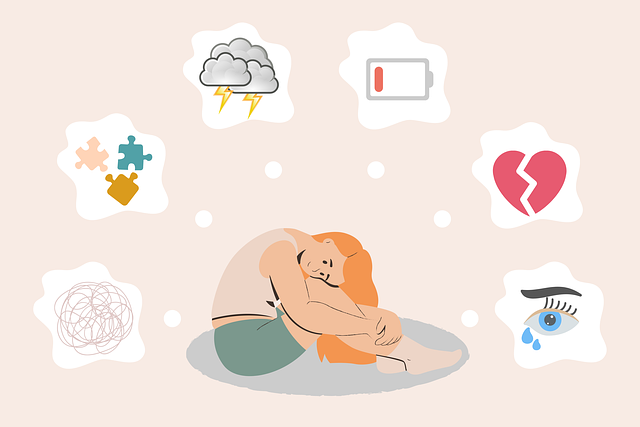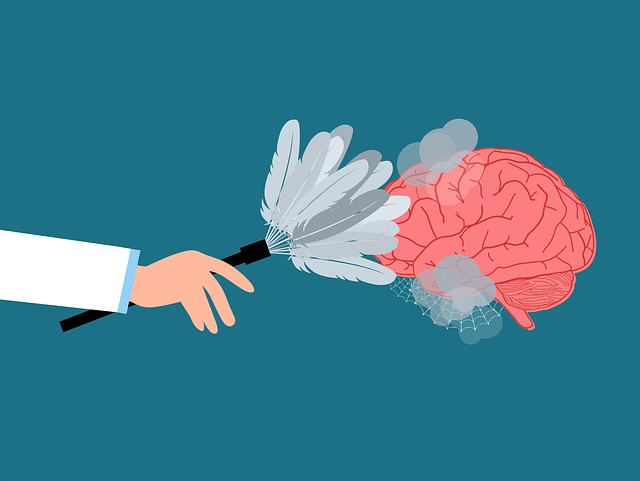Highlands Ranch Anxiety Therapy prioritizes risk management in mental health practice through comprehensive assessments, open dialogue, evidence-based methods, and regular training. Their multi-faceted approach includes identifying potential hazards, teaching coping skills, reducing stigma, and promoting stress reduction techniques. By building resilience among clients and staff, they create a supportive environment, ensuring effective care and optimal patient outcomes. Continuous monitoring, self-care, and specialized workshops further enhance their practices, making Highlands Ranch Anxiety Therapy a leading provider in mental health services.
Mental health professionals face unique challenges, with risk management being a critical component of their practice. This article explores a structured approach to mitigating risks within the context of Highlands Ranch Anxiety Therapy, a leading clinic. We delve into understanding various risks, from patient safety to staff well-being. By identifying hazards and implementing strategies, therapists can create a robust risk management plan. Continuous monitoring ensures adaptability, fostering a secure environment for both clients and practitioners at Highlands Ranch Anxiety Therapy.
- Understanding Risk in Mental Health Practice
- Identifying Potential Hazards at Highlands Ranch Anxiety Therapy
- Developing a Comprehensive Risk Management Plan
- Implementing Strategies for Safe and Effective Care
- Continuous Monitoring and Improvement for Mental Health Professionals
Understanding Risk in Mental Health Practice

In the realm of mental health practice, understanding risk is paramount for professionals like those at Highlands Ranch Anxiety Therapy. Risk encompasses a wide range of potential challenges and hazards that can impact both clients and practitioners. It’s not just about anticipating crises but also recognizing subtle indicators of distress, which may be early warning signs of escalating mental illness. By thoroughly assessing these risks, mental health professionals in Highlands Ranch can develop tailored strategies to mitigate them. This proactive approach forms the backbone of effective risk management planning.
One key aspect involves equipping clients with coping skills development through therapy sessions. Additionally, Mental Health Education Programs Design plays a vital role in empowering both clients and practitioners with knowledge about mental illnesses, their symptoms, and available treatments. On a broader scale, efforts towards Mental Illness Stigma Reduction Efforts are essential to fostering an inclusive environment where individuals feel comfortable seeking help without fear of judgment or discrimination.
Identifying Potential Hazards at Highlands Ranch Anxiety Therapy

At Highlands Ranch Anxiety Therapy, identifying potential hazards is a multifaceted process that forms the bedrock of our risk management planning. Our team recognizes that mental health professionals are often exposed to complex emotional landscapes and challenging situations, necessitating a proactive approach to mitigate risks. We conduct thorough assessments to uncover hidden dangers such as unexpected client reactions, ethical dilemmas, or even secondary trauma stemming from prolonged exposure to distressing narratives.
By integrating insights from our Mental Wellness Podcast Series Production, we foster an open dialogue that encourages both clients and therapists to articulate their concerns openly. Additionally, we implement evidence-based Stress Reduction Methods and Conflict Resolution Techniques as cornerstones of our risk mitigation strategy. These tools not only help in managing on-the-job stress but also ensure a safe and supportive environment for all parties involved, fostering therapeutic alignment and client well-being.
Developing a Comprehensive Risk Management Plan

Developing a comprehensive risk management plan is an essential step for mental health professionals to ensure a safe and supportive environment. This process involves identifying potential risks and hazards within the workplace, including those related to patient safety, staff well-being, and operational continuity. At Highlands Ranch Anxiety Therapy, we understand that managing risks effectively is crucial in fostering a positive therapeutic atmosphere.
A robust plan should incorporate strategies for stress management and reduction methods, such as promoting positive thinking and providing access to resources like employee assistance programs. Additionally, regular training on stress management workshops can empower professionals to handle challenging situations gracefully. By integrating these practices, mental health organizations like ours in Highlands Ranch can create a culture of resilience, where both staff and clients thrive despite the challenges that may arise.
Implementing Strategies for Safe and Effective Care

In implementing strategies for safe and effective care at Highlands Ranch Anxiety Therapy, mental health professionals must prioritize resilience building among their clients. This involves equipping individuals with the tools to navigate stress, overcome challenges, and maintain emotional balance. By fostering resilience, therapists enable their patients to better cope with anxiety and other mental health issues, enhancing overall well-being.
Moreover, integrating social skills training and conflict resolution techniques into therapy sessions is pivotal. These approaches not only facilitate healthier interpersonal interactions but also empower clients to manage relationships more effectively. Through these means, mental health professionals can ensure that their care is comprehensive, addressing both the individual’s mental health needs and their capacity to thrive in various social contexts.
Continuous Monitoring and Improvement for Mental Health Professionals

Mental health professionals must adopt a mindset of continuous monitoring and improvement to effectively manage risks and deliver quality care. Regularly reviewing case notes, patient outcomes, and feedback from peers and clients is essential. This process allows practitioners to identify areas for enhancement, such as recognizing emerging trends in patient presentations or evaluating the effectiveness of specific therapeutic techniques. By staying attuned to these insights, professionals can adapt their practices and stay current with best practices, ensuring optimal patient support.
Incorporating self-care routines and mental health education programs design is integral to this continuous improvement process. Encouraging professionals to prioritize their well-being fosters resilience, preventing burnout. Moreover, participating in specialized training and workshops enables them to enhance their skills, address knowledge gaps, and stay abreast of advancements in the field, ultimately benefitting their Highlands Ranch Anxiety Therapy practice.
Mental health professionals, like those at Highlands Ranch Anxiety Therapy, must prioritize risk management planning to ensure safe and effective care. By understanding risk in practice, identifying potential hazards, developing comprehensive plans, implementing strategic interventions, and continually monitoring improvements, therapists can mitigate challenges and foster a healthier work environment. Adopting these proactive measures not only benefits professionals but also enhances client outcomes, making Highlands Ranch Anxiety Therapy a beacon of best practices in mental health care.














